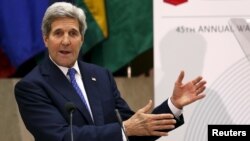Secretary of State John Kerry says the U.S. is open to further addressing its differences with Venezuela and attempting to find common ground.
“It is no secret that relations between our two countries have been severely strained in recent years,” Kerry said Tuesday at the Washington Conference on the Americas. The annual event is held by the Council of the Americas, an international business group dedicated to economic and social development in the Western Hemisphere.
Kerry said the U.S. was committed to forging a new kind of relationship with Latin America based on common goals such as strengthening democracy and ensuring respect for human rights.
The U.S. and Venezuela have locked horns over a number of issues recently. In March, the U.S. declared Venezuela a security threat and imposed sanctions on seven Venezuelan officials. The U.S. said the officials had engaged in acts of corruption and human rights violations, but the move prompted harsh criticism from Venezuela’s President Nicolas Maduro.
Also, in a 2014 report, the U.S. State Department cited Venezuela as one of the most frequently used routes for drug trafficking out of South America.
Although Venezuela is one of the top suppliers of foreign oil to the United States, the two countries have not exchanged ambassadors since 2010.
In his remarks, Kerry noted that President Barack Obama had spoken briefly with Maduro on the sidelines of this month’s Summit of the Americas hosted by Panama, and that senior State Department officials had recently visited Caracas at the invitation of the Venezuelan government.
A highlight of the Panama summit involved U.S.-Cuban efforts to normalize relations. Kerry said Tuesday that Washington’s efforts to re-establish ties with Havana were not a “leap of faith” but the best way to promote U.S. interests and values while helping Cubans achieve greater freedom and opportunities.
Kerry hailed the change in U.S. policy toward Cuba and cooperation in education, energy and trade with other Latin American countries as "a transformative moment for the Americas."
"We are determined to deliver on the strategic and historic opportunities that together we can create," he said.
Kerry said he and Obama met for hours with their Cuban counterparts in Panama, in the first such formal meetings since the 1950s. Cuban President Raul Castro told Obama that he was prepared to discuss a number of contentious issues, including human rights and press freedom. He acknowledged areas of continued disagreement and said resolving those matters would take time.
The U.S.-Cuba talks in Panama drew fierce criticism from some U.S. lawmakers and other political figures who accused Obama of supporting a repressive regime.
"Keeping up with a disturbing trend of this administration, President Obama is in the process of striking another very bad deal, now with the communist dictatorship of Cuba," Republican Senator Ted Cruz of Texas said in a statement following Obama's meeting with Castro.
"President Obama's approach gives the Castros exactly what they want — economic relief and legitimacy on the international stage," said Cruz, whose father was born in Cuba.
Cruz rejected Obama's assertion that his meeting with Castro was a step toward the future. "Unfortunately," the senator said, "he is leaving the Cuban people imprisoned in the past."
Obama has said the majority of Americans and Cubans support the restoration of bilateral ties.




